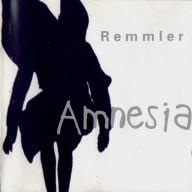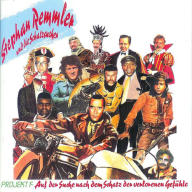Remmler was born on October 26, 1946, in Witten, Germany, and grew up in Bremerhaven. His father was an American diplomat, and Remmler soon discovered his love for rock & roll music, playing in a Stones-influenced beat band called Macbeats (later changed to Just Us) in the '60s. The band, in which Remmler sang, included Kalle Krawinkel on guitar, and played several gigs at Hamburg's famous Star Club. After several lineup changes, however, the band dissolved in December 1969. Remmler started studying a number of subjects in 1968 -- sociology, psychology, musicology -- and he and Krawinkel both became teachers. Remmler taught English, geography, and music, but not before releasing two unsuccessful 7" schlager singles unter the pseudonym Rex Carter.
With his full-time teaching position, it seemed that Remmler's music career was over even before it had begun. However, at the end of the '70s, after playing a one-off Just Us reunion concert, he and Krawinkel decided to quit the job and pursue their musical ambitions one more time. They formed a group called Wind and recorded a demo tape, but the band quickly dissolved, and in early 1980, the two of them -- together with drummer Peter Behrens -- started the minimalistic punk-meets-Neue Deutsche Welle group Trio. Trio soon found success in Germany, and with the release of their self-titled album in 1981 and the 1982 single Da da da Ich Lieb Dich Nicht Du Liebst Mich Nicht, the band broke through internationally. A second album, Bye Bye, followed in 1983.
During the success years of Trio, Remmler had two one-off solo projects: in 1984, he released a single called Feuerwerk (Fireworks), recorded as a duet with a young girl called Nina (her real name being Angela Smecca; the song was credited to "Stephan and Nina"). The same year, he recorded the narration for a recording of -Peter und der Wolf (Peter and the Wolf) conducted by John Williams. Furthermore, he provided the German voice of Edgar the computer in Steve Barron's 1984 film #Electric Dreams (originally spoken by Bud Cort).
After the release of Trio's third album, What's the Password, and their subsequent breakup, Remmler spent some time off in the Swiss Alps, working on new material without a clear vision of what he was trying to do. The songs slowly became more concrete, and after several recording sessions with a number of his musician friends -- among them Trio's producer Klaus Voormann, drummer Curt Cress, singer Annette Humpe (and her sister Inga), and Männerquartett Weilerswist -- his first solo album was released in 1986. The self-titled effort had little to do with Trio's dry guitar-and-drums sound, even though Remmler's laconic voice and the simple song structures were still in place. On the album, Remmler flirted with schlager music, children's songs, and even volksmusik, and it included two hit singles -- the sarcastic pop song Keine Sterne in Athen, which stayed in the German charts for 17 weeks, and the funny surprise hit Alles Hat ein Ende (Nur die Wurst Hat Zwei) (Everything Has an End [Only a Sausage Has Two]), which was released as a single after a cover version by Gottlieb Wendehals proved to be highly successful at the German carnival. An English-language version of Keine Sterne in Athen, recorded as I Don't Go to U.S.A., reached number one on the Filipino charts.
Remmler began work on his second solo album, Lotto (1987), which was musically similar to the self-titled effort and involved many of the same musicians, but also Spliff keyboarder Reinhold Heil, Austrian pop singer Rainhard Fendrich, and even the group Status Quo. Parts of the album were recorded in Rio de Janeiro, reflected in the samba rhythms of Dass das Nicht die Große Liebe War Klar (That That Wasn't True Love Was Clear). The first single, Keine Angst Hat der Papa Mir Gesagt (Don't Be Afraid, Papa Said to Me) was only a minor success, and the album sold much less copies than its predecessor. A major tour to promote the album was largely canceled due to the fact that not many advance tickets were sold. Remmler appeared on several television shows, however, even performing the single Drei Weiße Birrrken together with Status Quo.
After the release of Lotto, Remmler took a short break from the music business to spend time with his family, living both in Basel, Switzerland, and Brazil. A 1990 compilation 10 Jahre bei der Stange (Sticking to It for 10 Years) collected several of his hits, both solo and with Trio.
In 1991, Remmler returned with the album Projekt F -- Auf der Suche Nach dem Schatz der Verlorenen Gefühle on which he covered songs by Austrian schlager singer Freddy Quinn. The album was neither commercially nor critically successful. Remmler's 1993 album Vamos proved slightly more successful: the album, which is much more rock-based than his earlier solo output, was recorded with Udo Lindenberg's backing band, Panikorchester (Panic Orchestra), and included a guest spot by German punk band Die Toten Hosen and a recording of Du Ich Wär So Gern bei Dir, an old Trio song that was never recorded but appeared in their live sets. On tour, Trio guitarist Kralle Krawinkel opened for Remmler, promoting his first solo album. 1994 saw the release of Remmler's first live album, HÜH!, which featured several Trio songs. After appearing and singing in Peter Maffay's rock musical +Tabaluga Lili, Remmler released the more serious rock album Amnesia in 1996.
In the next few years, Remmler largely remained out of the limelight. He lent his voice to the Soul-O cover of Da da da and produced an album by his three sons, Cecil Jonni Lauro, but it remained unreleased after an advance single flopped. Finally, in 2006, Remmler released a new single (Frauen Sind Böse [Women Are Evil]) and a new, electronica-inspired album called 1,2,3,4 .... In 2007, he scored the German movie #Vollidiot, for which he also released a single together with Nena and German comedian Oliver Pocher: Ich Kann Nix Dafür (I'm Not to Blame). ~ Christian Genzel, Rovi

















